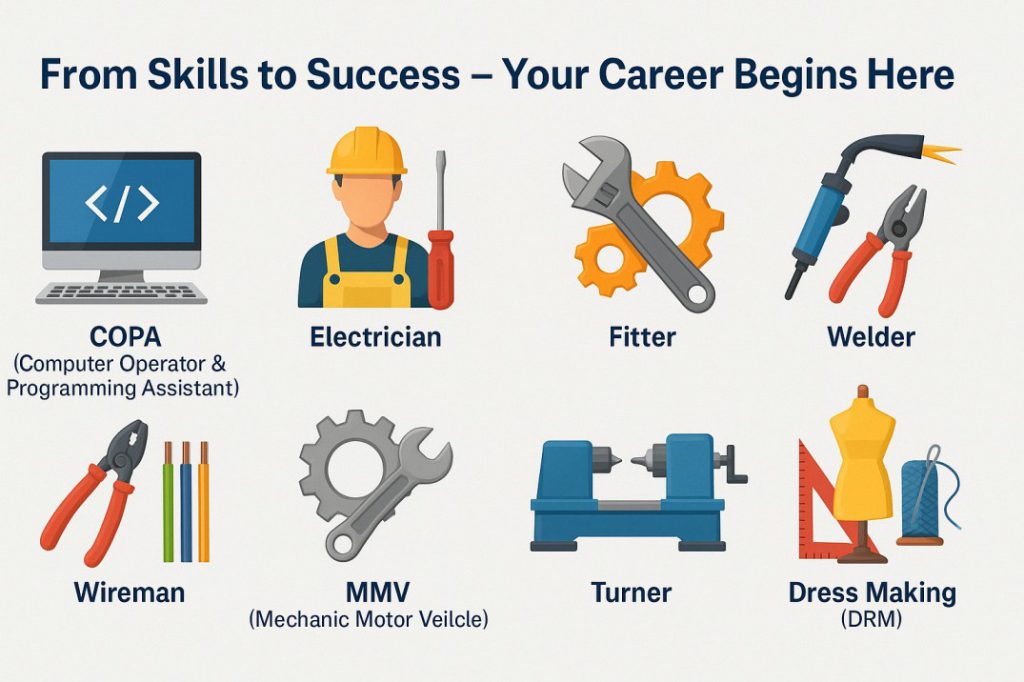CAREER
| HOME | GALLERY | COURSES | CAREER | ABOUT |

1. COPA (Computer Operator & Programming Assistant)
The objective of the COPA trade is to produce IT professionals who are well-versed in computer operations, software usage, and basic programming. The course is designed to train students in data entry, digital communication, document processing, web designing, and database handling. It also introduces them to programming logic, internet tools, and cybersecurity essentials. Trainees become equipped to work in IT-enabled services, government and private offices, or pursue self-employment in computer-based services.
2. Electrician
The Electrician trade aims to develop technically skilled manpower capable of installing, maintaining, and troubleshooting electrical systems and equipment. Trainees are taught to handle domestic, commercial, and industrial wiring systems, panel installations, transformers, and motor control systems. The course emphasizes electrical safety, renewable energy systems, and energy efficiency. It opens career opportunities in power plants, industries, public utilities, and as licensed contractors or independent service providers.
3. Fitter
The objective of the Fitter trade is to prepare students for precision mechanical fitting work including assembly, installation, and maintenance of machinery. Trainees gain proficiency in handling tools, measuring instruments, blueprints, and mechanical drawings. They learn various fitting operations like drilling, grinding, filing, and alignment, which are essential in manufacturing, repair, and maintenance sectors. The trade builds a strong foundation for working in production plants, fabrication units, and engineering workshops.
4. Welder
This trade is designed to impart skills related to metal joining techniques using modern welding processes such as SMAW, GMAW, GTAW, and gas cutting. The course includes fabrication work, structural welding, and pipe welding in various positions. Safety standards, blueprint reading, and welding quality checks are also emphasized. Graduates find opportunities in shipbuilding, construction, automobile, and heavy industries, or may start their own fabrication and repair businesses.
5. Wireman
The objective of the Wireman trade is to train students in the installation and maintenance of electrical wiring systems, control panels, and lighting setups. Trainees are taught to interpret wiring diagrams, use electrical testing equipment, and ensure compliance with safety standards. The course also includes training in fault diagnosis, grounding, and maintenance of electrical appliances. Graduates can work in building construction, maintenance departments, or pursue individual electrical contracting.
6. MMV (Mechanic Motor Vehicle)
The MMV trade aims to produce skilled mechanics capable of maintaining, repairing, and diagnosing faults in motor vehicles. The course covers both petrol and diesel engines, transmission systems, electrical systems, brakes, steering, suspension, and modern diagnostic tools. Emphasis is placed on hands-on practical training with the latest automotive technology. Graduates may find employment in service stations, automobile manufacturing units, transport corporations, or open their own workshops.
7. Turner
The Turner trade is focused on developing skills in metal cutting and shaping using lathes and related machine tools. Trainees learn to operate conventional and CNC lathes, interpret technical drawings, and maintain production quality. The curriculum includes training in threading, taper turning, boring, and part finishing. This trade prepares students for careers in tool rooms, machine shops, aerospace, automotive, and precision manufacturing sectors.
8. Dress Making (DRM)
The Dress Making trade provides comprehensive training in garment construction, tailoring, and fashion basics. The objective is to develop skilled professionals in cutting, sewing, designing, and fitting garments for men, women, and children. The curriculum covers pattern making, use of modern sewing machines, garment finishing, and fabric knowledge. Graduates are prepared for employment in the apparel and fashion industry or may start their own boutique or tailoring unit.
